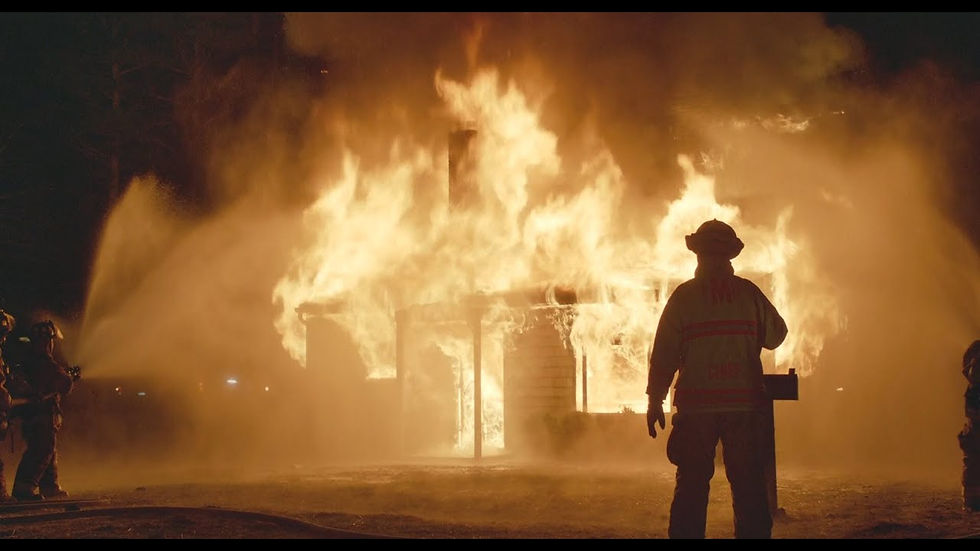You Can't Just Die; A Moment Of Grief In Manchester By The Sea
- Fiona Craughwell
- May 8, 2022
- 4 min read
Updated: Jul 21, 2022
My most sincere apologies to my loyal reader for my absence. I will do my very best to ensure it never happens again. Anyway, I am back, and we are going to kick things off with Short Cut. Some people have a comfort food, song or even a book. I have comfort films and, within them, comfort scenes. This week’s scene is a powerful one and totally stands out on its own. Even if you don’t watch the entire film, I would nearly guarantee that you would have a huge emotional response to this scene and film: Manchester by the Sea (MBTS).
It is not just the title that brings the image of water and waves to the forefront of your mind. This scene washes waves of emotion over a viewer gently and in an unrelenting manner. Much like the sea itself, it stops for no one. Like the sea and its waves in its complex but effortless rhythm, each emotion in this scene seamlessly passes into another, continuously but naturally.

As always, context is key, so don’t say I didn’t warn you. Lee has three children with his wife Randi, but an awful and tragic accident caused by Lee has resulted in the deaths of their children. Randi has survived; well, survived as well as one can after the passing of all of their children. Our scene begins in a police station where Lee needs to be questioned. Thankfully, the whole point of the scene is for Lee to explain how such terrible events unfolded, so I don’t need to ruin too much of the story for you, but I bet I have piqued your curiosity. The brilliance of this scene stems from what is seemingly insignificant and the subtle techniques used to evoke incredibly deep emotions.
The music is sombre but classical. It seems totally out of place with Lee as a character and, indeed, with the setting altogether. Classical music is not usually associated with the hard-working class or, indeed, tough, gritty environments like police stations, but classical music, especially operatic scores, are absolutely kindred to devastation and unbearable pain.
Considering this, it is a very fitting score, and the juxtaposition caused by the merging of the two worlds creates its own meaning. We know that this music does not totally fit on a subconscious level. This disrupts us and causes us to pause and look for meaning; why is this music playing now? What does it mean?

As is typical, as the music builds and climaxes, so too does the drama and pretty soon the classical, emotional score is all we can hear. What is clever here is that even when the dramatic action has stopped, the music continues into the next cutaway images of the gulls, fishing boats and rough waves, showing us that this deep pain and sadness will remain long after the police station, long after this night and well into the future, in every moment of Lee’s life.
In terms of camera and cinematography, the scene starts as expected and pretty normal. The camera establishes where we are, who is present (Lee, his brother, his father and the various police officers) and, of course, who and what our focus is. In order to show us all of this, the camera must keep a distance. However, as Lee tries to find the words to explain how such a horrific night came to pass, the camera stealthily encroaches upon him, and we forget anyone else is even around. Lee is like the landscape around him, an island being bashed by the waves and beaten by the wind alone.
Soon we are uncomfortably close to Lee and, by being close to him, we are uncomfortably close to this unspeakable tragedy. The camera forces us to face both Lee and his unimaginable pain and the death of three young children.

All of this is great, but what makes the scene truly beautiful is the simplicity and most genuine human moment that comes from the film’s emotional and dramatic climax.
Lee is free to go as what he did was an accident. Since the law cannot punish him, Lee decides to take matters into his own hands and punish himself. As he leaves the interrogation room, Lee grabs an officer's gun that he passes, but it doesn’t go off. He cocks it, but still nothing. He is surrounded by officers and has several guns pointed at him by this time. Lee’s brother and father have been waiting to find out Lee’s fate, but now they are present for his suicide attempt, and this is where the real emotion comes from.
His brother leaps from his chair to come to his aid, but his father is totally overwhelmed by what is happening before his eyes and cannot stand up without leaning on the armrest. We see this image of his dad clutching and struggling to stand up three times. It is a powerful representation of shock and pain. Our fathers are typically the strong front of a family, but he is human and vulnerable here. His family is panicked and devastated by the immediate danger Lee has placed himself in, but they also realise that Lee is in so much pain that he would rather die than live with it.
MBTS is a realistic and haunting depiction of grief, the people, and the conversations. At times, it is uncomfortably real and reminds each viewer of their own grief. It is simple but powerful, and scenes such as the one described make it such a moving film.






Comments